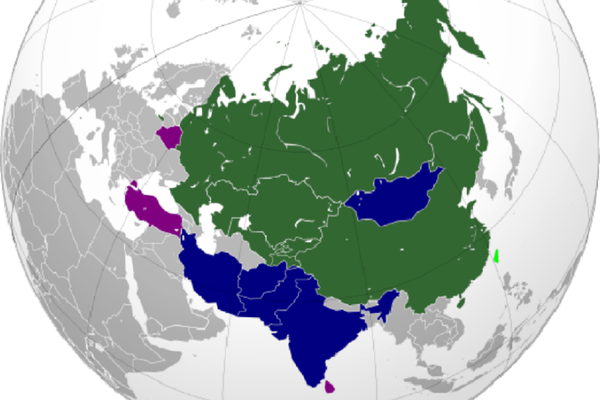India’s Defence Secretary participated in a Defence Ministers’ meeting along with others from Shanghai Cooperation Organisation (SCO) member states in Astana, Kazakhstan.
Key highlights of the meet:
- During the gathering, a significant protocol was signed, underscoring the collective commitment of all SCO members towards fostering peace and cooperation in the region.
- The meeting concluded with a Joint Communique, emphasizing key agreements and initiatives, including the embrace of the ethos of ‘One Earth, One Family, One Future’, inspired by the timeless Indian philosophy of ‘Vasudhaiva Kutumbakam’.
- Vasudhaiva Kutumbakam is a Sanskrit phrase found in Hindu texts such as the Maha Upanishad, which means “The World Is One Family“.
About SCO:
- SCO is a permanent intergovernmental international organization established in 2001 at Shanghai summit by the Kazakhstan, China, Kyrgyz Republic, Russia, Tajikistan and Uzbekistan.
- It is the successor to the Shanghai Five, formed in 1996 between the China, Kazakhstan, Kyrgyz Republic, Russia, and Tajikistan.
- SCO has nine member countries (India Joined in 2017), three observer countries and Six countries have dialogue partner status with the SCO.
- The official languages of the SCO are Russian and Chinese.
- The SCO is governed by the Heads of State Council (HSC), its supreme decision-making body, which meets once a year.
- The organization also contains the Regional Antiterrorist Structure (RATS).
- Executive Committee of the Regional Anti-Terrorist Structure (RATS) is in Tashkent.
Principles:
- Internally, the SCO upholds the “Shanghai spirit” of mutual trust, mutual benefit, equality, consultation, respect for diversity of civilizations, and pursuit of common development.
- Externally, it advocates non-alignment, avoids targeting other countries or regions, and promotes openness.
Goals of the SCO:
- To strengthen mutual trust, friendship and good-neighborliness between the Member States;
- To encourage the effective cooperation between the Member States in such spheres as politics, trade, economy, science and technology, culture, education, energy, transport, tourism, environmental protection, etc.
- To jointly ensure and maintain peace, security and stability in the region; and
- To promote a new democratic, fair and rational international political and economic international order.
Significance of SCO for India:
- Regional Security: RATS collaboration on security and intelligence sharing to address challenges like terrorism, extremism, and drug trafficking.
- Economic Opportunities: Opens avenues for energy procurement, infrastructure projects, and trade with Central Asia.
Energy Cooperation: Central Asia’s rich reserves of oil, natural gas, and minerals like uranium are vital for energy security. - Diplomatic Engagement: Offers a platform to manage relations with neighbors, including China and Russia, and counterbalance Chinese influence.
- Connectivity Projects: Supports India’s initiatives for regional connectivity by giving boost to initiatives like Chabahar Port, International North-South Transport Corridor (INSTC), etc.
- Cultural Exchanges: Enhances cultural and educational ties with SCO countries, fostering mutual understanding.
- Multilateralism: Provides an avenue for promoting multilateralism and a more inclusive global governance framework.
Challenges for India in SCO:
- Balancing Relations: India is part of the Quad, which requires it to balance its relations with China and Russia, who have different regional and global priorities.
- Anti-Western forum: Western countries perceive the SCO as an anti-Western forum.
- Security Concerns: Addressing security issues, particularly with neighboring Pakistan and China.
- Economic Competition: Navigating economic dynamics with dominant regional players, especially China.
- Connectivity Projects: Dealing with regional connectivity initiatives that conflict with India’s sovereignty concerns, such as the Belt and Road Initiative.
Ref:Source
| UPSC IAS Preparation Resources | |
| Current Affairs Analysis | Topperspedia |
| GS Shots | Simply Explained |
| Daily Flash Cards | Daily Quiz |



